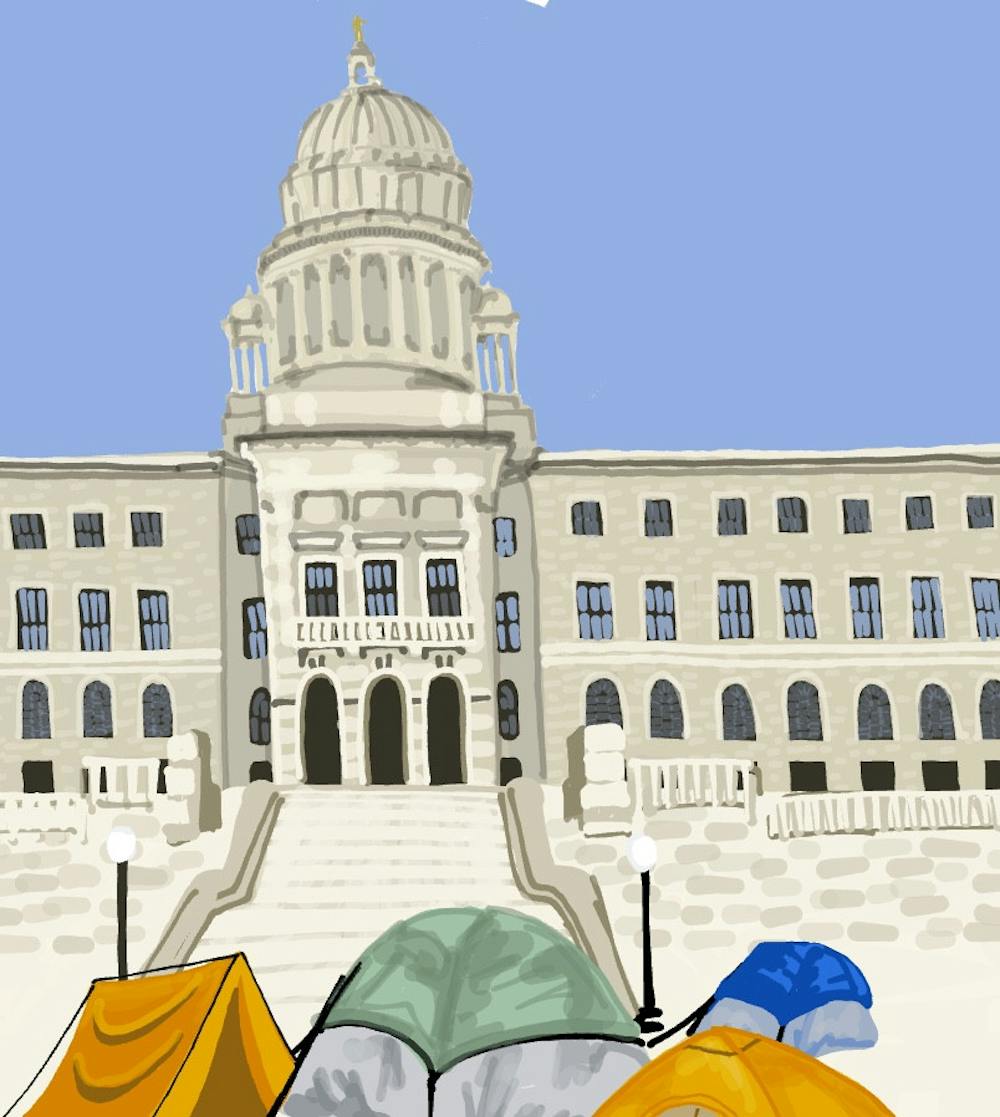In December, Mayor Jorge Elorza granted $495,000 in federal emergency COVID-19 response funding to Crossroads RI, a service provider for people experiencing housing instability across the state. The decision followed 16 consecutive nights of a sleep-out protest at the Rhode Island State House organized by State Senator Cynthia Mendes to advocate for housing justice.
Since then, activists combatting homelessness have continued working to address housing instability, with many hoping the state will do more to address Rhode Island’s housing crisis.
A statewide housing crisis
According to Crossroads, about 4,000 people experience homelessness annually in Rhode Island.
The Rhode Island Coalition to End Homelessness counted a total of 1,267 people experiencing homelessness in the state on the night of Jan. 26, 2021 — an approximately 15% increase since the start of the COVID-19 pandemic. From 2020-21, the Coalition’s count of people experiencing homelessness who are aged 18-24 roughly doubled.
Eric Hirsch, an urban sociologist and professor at Providence College, explained that even with the new shelter beds obtained through the government’s funding, shelters are at capacity with little turnover. He said that the pandemic and evictions are to blame.
Hirsch added that the current housing market in Rhode Island “forces people out of the housing pipeline and into the homeless pipeline.”
Professor of anthropology Irene Glasser said that Rhode Island lacks sufficient “affordable housing,” which means that housing costs require no more than 30% of one’s income. Yet in Rhode Island, many people are unable to afford a home at this rate.
Hirsch said that people often try to blame homelessness on the person experiencing it when the problem really exists within the housing system, which has become more apparent through the effects of the pandemic. Hirsch added that resources should focus on working to “slow the influx of people into shelters and living outside and make sure people are getting into permanent housing on the other end of the system.”
Using the city funding, Crossroads RI is currently working “toward an expansion of emergency shelter and diversion programs,” wrote Mike Raia, spokesperson for the organization.
The sleep out
Protesters slept outside of the State House for 16 consecutive nights beginning Nov. 30 to advocate for housing justice and legislative reform, “capturing the attention of national media and culminating in a night where nearly 100 Rhode Islanders slept in solidarity and protest outside the State House,” Mendes wrote in an email to The Herald.
“Our government was not acting and the State Senate was not in session and displayed no interest in returning early to address the crisis, so I felt I needed to do something,” Mendes wrote. “On Nov. 30, I pitched a tent along with … other community members outside the State House to demand that our government provide safe and dignified shelter.”
The protest attracted the involvement of students from the University.
“I found something very satisfying about the juxtaposition of these flimsy tents sitting on the marble of the statehouse,” said Rocket Drew ’22, co-director of Housing Opportunities for People Everywhere, who participated in the protests. “It made the statement that this big imposing building is as flimsy as one of these tents.”
“If we build a structure like this that is so magnificent and can endure and stand the test of time, why can't we do something as simple as make sure that our homeless neighbors have somewhere warm to sleep tonight?” Drew asked.
Response and public perception
Mayor Jorge Elorza issued a statement Dec. 8 about the money given to Crossroads, saying that “our city and state are facing a housing affordability crisis and a growing need for mental health and social service supports.”
“This investment is just the beginning of allocating our Providence Rescue Plan dollars to supporting the crucial work of partners like Crossroads RI, who are dedicated to serving our unsheltered neighbors,” Elorza continued.
In 2021, Crossroads provided housing services to over 3,500 Rhode Islanders, according to Raia.
“More than 900 adults and children secured a new place to call home, and we helped nearly 750 adults and more than 450 children maintain stable housing,” Raia wrote. “And through our diversion programs, we helped nearly 500 Rhode Islanders — including more than 330 children — avoid homelessness.”
But some are not satisfied with the government’s response. “Throwing money at a problem as complex and deeply rooted as this one is not going to be sufficient to solve it,” Drew said. He added that more entrenched issues, such as the lack of access or ability, can prevent people from obtaining the resources they need to maintain stable housing.
According to Mendes, the money “was definitely not sufficient, and we know that because there are still people who don’t have safe and dignified shelter for this winter,” she wrote. “The $475,000 that went to Crossroads is just a drop in the bucket of what’s needed to make sure that no one is without shelter this winter.”
Moving forward, Mendes believes “Rhode Island needs a massive investment in affordable and low-income housing, and we have an unprecedented opportunity to do it.” She added that funding from the American Rescue Plan Act could enable the state to “build thousands of safe, green and affordable homes, but the leadership in this state has chosen to underinvest in housing.”
In a statement from the mayor released Jan. 5, the City of Providence announced a proposal for the allocation of more funds to assist the housing crisis. “The proposed ARPA ordinance allocates $28,100,000 to addressing housing and homelessness, with $17,000,000 being allocated to affordable housing development and $4,000,000 allocated to expand rapid rehousing,” Elorza wrote.
Gov. Dan McKee also announced the addition of 130 emergency beds for those who are experiencing homelessness Dec. 16, according to The Boston Globe.
Ongoing advocacy efforts
Many of the resources that were typically held for people experiencing homelessness are now limited or entirely unavailable, according to Janice Luongo, editor of Street Sights, a newspaper for and by people experiencing homelessness that provides them with various resources. Luongo added that due to disruptions caused by the pandemic, she is unsure which meal sites remain open, which makes it difficult for her to put that information in the newspaper.
Street Sights was forced to pause its production because of the pandemic. The paper published its second issue since the start of the pandemic in February and is currently raising money to continue printing, according to Luongo.
“COVID exacerbated the situation (with homelessness in Rhode Island),” Luongo said. “I’m honored to be doing this.”
“(It’s) exhausting, but worth it,” Luongo added.
Street Sights seeks to build greater connections with the community. The paper includes a “Creative Works” section that shows poems and art mainly from the paper’s readers. This page gives people outside the publication the “opportunity to express themselves in other ways that they may not be able to,” Luongo said.
HOPE, a campus organization working to address homelessness and poverty, hosts a variety of different programs that aim to address homelessness in Rhode Island. HOPE’s outreach programs include giving out supplies to people experiencing homelessness and serving meals at a local soup kitchen.
“A lot of what goes through the outreach program is listening to people's stories and building connections and relationships,” Drew said.
Gabe Mernoff ’22.5, HOPE’s advocacy coordinator, said that the main goal of HOPE’s advocacy programming “is to eliminate the structural issues that necessitate the need for outreach in the first place.” With this side of programming, the group focuses on initiatives to “increase the supply of affordable housing and eliminate unnecessary barriers,” Mernoff added.
Luongo said that by looking back through old issues of the Street Sights, one can see how little change has been made to help homelessness in the state. However, teaching people about the roots of homelessness and the people it impacts, whether through a newspaper, class lecture or talking to people, helps underscore that change is needed, she said.
“Education is the key to all of this,” Luongo added.

Elysée is a writer for metro, a producer for the Bruno Brief podcast and an aspiring card game creator. She is a second-year student studying International and Public Affairs on the Policy and Governance Track.





